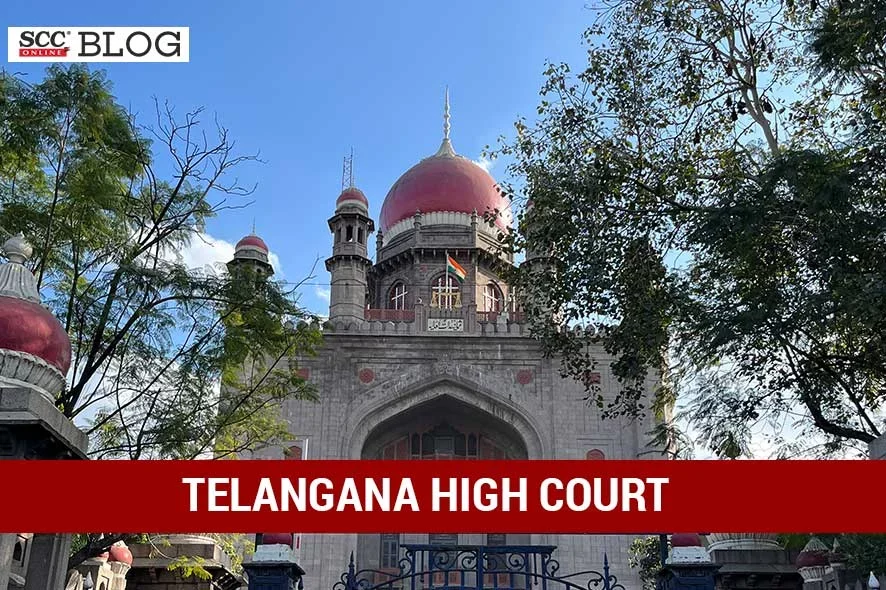Telangana High Court: In a public interest litigation (‘PIL') assailing the award of contract for construction of flats to homeless persons by Greater Hyderabad Municipal Corporation (‘GHMC') to DEC Infrastructure Projects India Pvt. Ltd. (‘DEC'), the Division Bench of Alok Aradhe, CJ.* and T. Vinod Kumar, J. dismissed the PIL and held that the grant of construction project to the DEC was fair, just and reasonable.
Background
The matter arose from the Government of Telangana's commitment to provide two-bedroom houses to all the homeless poor families in the State through the 2 Bedroom Housing Programme in a phased manner. Guidelines were issued on 15-10-2015 for implementation of 2BHK houses across the State to all the families at the cost of Rs.1.5 lakh each flat. Subsequently the cost of flat was increased from Rs.5.30 lakhs to Rs.7.00 lakhs. Thousands of houses were constructed by various companies. For some balance work, the GHMC directed the DEC to complete the construction of about 2412 2BHK houses. The DES completed the allowed construction work and handed it over for completion certificate on 11-10-2022.
The petitioner's case was that the GHMC's action in awarding the construction work worth Rs.180 crores without inviting any tenders for construction of 2412 2BHK houses without calling any tender was arbitrary. The petitioner was aggrieved by the excess payment of Rs. 68 crores to the DEC, which was 38 percent above of the contract amount. In an interim order, the Court had directed that no payment shall be made by the GHMC to the DEC.
Decision
The Court referred to Indian Medicines Pharmaceuticals Corpn. Ltd. v. Kerala Ayurvedic Coop. Society Ltd., 2023 SCC OnLine SC 5, wherein it was held that Government Contracts must be awarded by a transparent process, while there may be situations which warrant a departure from the rule of inviting tenders or conducting public auctions, the departure must not be unreasonable or discriminatory. The Court also referred to Villianur Iyarkkai Padukappu Maiyam v. Union of India, (2009) 7 SCC 561, wherein it was observed that “In a case where the State is allocating resources such as water, power, raw materials, etc. for the purpose of encouraging development, the State is not bound to advertise and tell the people that it wants development in a particular manner and invite those interested to come up with proposals for the purpose”. The Court also referred to several other authorities where it has been discussed at lengths that it is settled law that State and its agencies must award contracts through tenders and auctions, however there are rare and exceptional circumstances, when the State can deviate from the rule.
The Court also noted that there are two reasons for the preferred method of inviting tenders and conducting public auctions: firstly, procurement can be made at the best price; and secondly, allocation is through a transparent process. However, if the purpose of allocation by the State is not revenue maximization, the State could award contracts through other methods, provided it is non-arbitrary and meets the requirements of Article 14 of the Constitution of India.
The Court applied the settled legal principles to the matter at hand. The Court said that the Executive Engineer under Andhra Pradesh Detailed Standard Specifications (APDSS) has the authority to ensure completion of the part of the work which could be abandoned by anyone. It was noted by the Court that on the Executive Engineer's recommendation for award of contract to the DEC, the GHMC made the impugned direction. The Court also pointed that no material was brought on record to show any financial loss to the public exchequer due to the payments made to the DEC. Therefore, the Court held that the action of the GHMC and DEC was just, fair and reasonable and the deviation from route of inviting tender was neither discriminatory nor arbitrary inviting the wrath of Article 14 of the Constitution of India. Further, the Court also said that it is trite and settled law that the doctrine of delay and laches applies to the PIL as well.
Thus, the Court dismissed the PIL and directed for timely payments to the DEC as per the terms and conditions of the contract.
[Gonewar Chandu v. State of Telangana, Writ Petition (PIL) No.1 of 2023, Decided on 24-08-2023]
* Judgment Authored by: Chief Justice Alok Aradhe
Advocates who appeared in this case :
For the petitioner: Advocate E. Ramesh Chandra Goud
For the respondents: Government Pleader Pasham Krishna Reddy, Advocate Ch. Jayakrishna, Advocate K. Ravinder Reddy, Advocate M. Govind Reddy, Advocate M.P.K. Aditya
*Deeksha Dabas, Editorial Assistant has reported this brief








